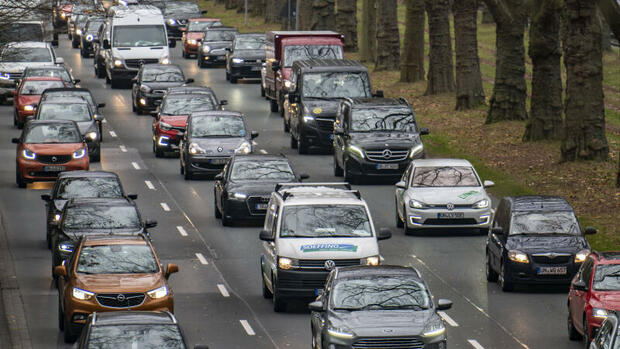Eight EU countries are opposed to new emissions standards.
(Photo: Imago)
Dusseldorf, Brussels The EU Commission’s efforts to tighten emissions standards for cars threaten to fail due to resistance from member states. In the European Council, which represents the interests of the national governments, a blocking minority has formed against the so-called Euro 7 standard. In a joint position paper, Italy, France and six other EU countries make it clear that they reject “any new emission standards (including new test methods or limit values) for cars and small trucks”.
The countries have enough votes in the council to prevent the law from being passed. This means that the new regulation will in all likelihood not come into force – even if a majority is found in the EU Parliament, which also still has to agree.
The German auto industry should be relieved, they had fought the project politically. The association of European automobile manufacturers Acea published a study on Tuesday, according to which the costs for manufacturers due to Euro 7 are four to ten times higher than those set by the EU Commission.
Euro 7 standard: price surcharges for customers are significantly higher
Specifically, cars and vans with combustion engines could be around 2,000 euros more expensive per vehicle for manufacturers. For diesel trucks and buses, it would be a good 12,000 euros. The estimates reflect pure production costs; according to the industry association, the price premiums for customers would be significantly higher. For comparison: In its impact assessment, the EU Commission assumes additional costs of a few hundred euros for cars and vans, and for trucks and buses it is around 2800 euros more.
Europe’s automotive industry strives to further reduce emissions “for the benefit of the climate, the environment and health,” said Acea CEO Sigrid de Vries. “However, the Euro 7 proposal is simply not the right way to achieve this, as it would have extremely low environmental impact and extremely high costs.”
>> Read here: Debate on the future of e-fuels – “With all due respect, this is complete nonsense”
Renault boss Luca de Meo had already warned of severe consequences from Euro 7 in February. At Renault alone, the EU Commission’s proposal would probably lead to the “closure of at least four plants within a short period of time,” de Meo rumbled in an open letter. Above all, the tough test conditions are a thorn in the side of the automotive industry.
“One cannot accept a society where exposure to air pollution is responsible for more than 300,000 premature deaths each year,” Vestager said.
(Photo: Reuters)
Large car companies such as Volkswagen and Stellantis also criticize the timing of the Commission’s proposal. According to Brussels, the emission standard should come into force in the summer of 2025. If Euro 7 starts at this point in time, “there is a risk of a production stop for many models lasting many months,” says a VW position paper. “Brands, plants and workers across Europe would be affected.”
The Wolfsburg carmaker is therefore against introducing the standard before autumn 2027 for all vehicle types. In the case of new vehicle types, it would be realistic to introduce them after autumn 2026 at the earliest.
Euro 7 standard: traffic light coalition disagrees
In Berlin, the federal government is divided on the Euro 7 issue: while the Greens support the tightening of emission standards, the FDP was skeptical. The EU Commission presented its proposal last autumn. The declared goal was to improve the air quality in Europe’s cities. “We cannot accept a society where exposure to air pollution is responsible for more than 300,000 premature deaths every year in the 27 EU countries alone,” said Commission Vice-President Margrethe Vestager at the time.
>> Read here: Climate protection without bans? It does not work
The Euro 7 standard was not only intended to lower the limit values for permitted emissions of harmful gases such as nitrogen oxides. Abrasion from brakes and tires, the largest source of emissions from electric cars, should also be regulated.
The opponents of the reform state in their position paper that compliance with the emissions regulations would tie up investments that are necessary for the climate-neutral conversion of the transport sector. From their point of view, only the regulations for brakes and tires, which will remain relevant after 2035, when almost only electric cars are to be approved, can be approved.
More: Manufacturer outraged by the new Euro 7 emissions standard
